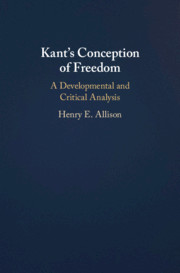Book contents
- Kant’s Conception of Freedom
- Kant’s Conception of Freedom
- Copyright page
- Dedication
- Contents
- Preface
- Acknowledgments
- Note on Sources and Key to Abbreviations and Translations
- 1 Kant’s Writings of the 1750s and the Place in Them of the Free Will Issue
- 2 Kant’s Theoretical Philosophy in the Early 1760s and Its Relation to His Conception of Freedom
- 3 Kant’s Moral Philosophy in the Early 1760s
- 4 Kant’s Dialogue with Rousseau Supplemented by His Dreams of a Spirit-Seer
- 5 From the “Great Light” to the “Silent Decade”: Kant’s Thoughts on Free Will 1769–1780
- 6 Kant’s Account of Free Will in the Critique of Pure Reason
- 7 From the Critique of Pure Reason to the Groundwork
- 8 The Fact of Reason and Freedom in the Critique of Practical Reason
- 9 The Critique of the Power of Judgment and the Transition from Nature to Freedom
- 10 Kant’s Final Thoughts on Free Will
- Bibliography
- Index
3 - Kant’s Moral Philosophy in the Early 1760s
Published online by Cambridge University Press: 19 December 2019
- Kant’s Conception of Freedom
- Kant’s Conception of Freedom
- Copyright page
- Dedication
- Contents
- Preface
- Acknowledgments
- Note on Sources and Key to Abbreviations and Translations
- 1 Kant’s Writings of the 1750s and the Place in Them of the Free Will Issue
- 2 Kant’s Theoretical Philosophy in the Early 1760s and Its Relation to His Conception of Freedom
- 3 Kant’s Moral Philosophy in the Early 1760s
- 4 Kant’s Dialogue with Rousseau Supplemented by His Dreams of a Spirit-Seer
- 5 From the “Great Light” to the “Silent Decade”: Kant’s Thoughts on Free Will 1769–1780
- 6 Kant’s Account of Free Will in the Critique of Pure Reason
- 7 From the Critique of Pure Reason to the Groundwork
- 8 The Fact of Reason and Freedom in the Critique of Practical Reason
- 9 The Critique of the Power of Judgment and the Transition from Nature to Freedom
- 10 Kant’s Final Thoughts on Free Will
- Bibliography
- Index
Summary
Having considered Kant’s metaphysical views as expressed in his writings and lectures of the early 1760s and their relation to his conception of freedom (human and divine), we now turn to his forays into moral philosophy during the same period. Unfortunately, it cannot be claimed that these shed a great deal of direct light on the free will issue, since that is largely peripheral to the moral theory with which Kant was most concerned during the period, namely, Hutchesonian sentimentalism. Nevertheless, much as was the case with his texts and lectures on metaphysics, they help to clarify the naturalistic perspective from which Kant considered free will at the time. The discussion focuses on four texts and is divided into four parts. The first is the section of the Prize Essay devoted to ethics, which contains Kant’s earliest published treatment of the topic. The second is Kant’s published Announcement of his lectures for the Winter of 1765–6, which prominently includes a series of lectures on ethics. The third is Herder’s notes from Kant’s lectures on moral philosophy between 1762 and 1764. The fourth is the portion dealing with ethical themes in Observations on the Feeling of the Beautiful and the Sublime [Beobachtungen über das Gefühl des Schönen und Erhabenen] (1764) (henceforth referred to as Observations).
- Type
- Chapter
- Information
- Kant's Conception of FreedomA Developmental and Critical Analysis, pp. 85 - 124Publisher: Cambridge University PressPrint publication year: 2020



